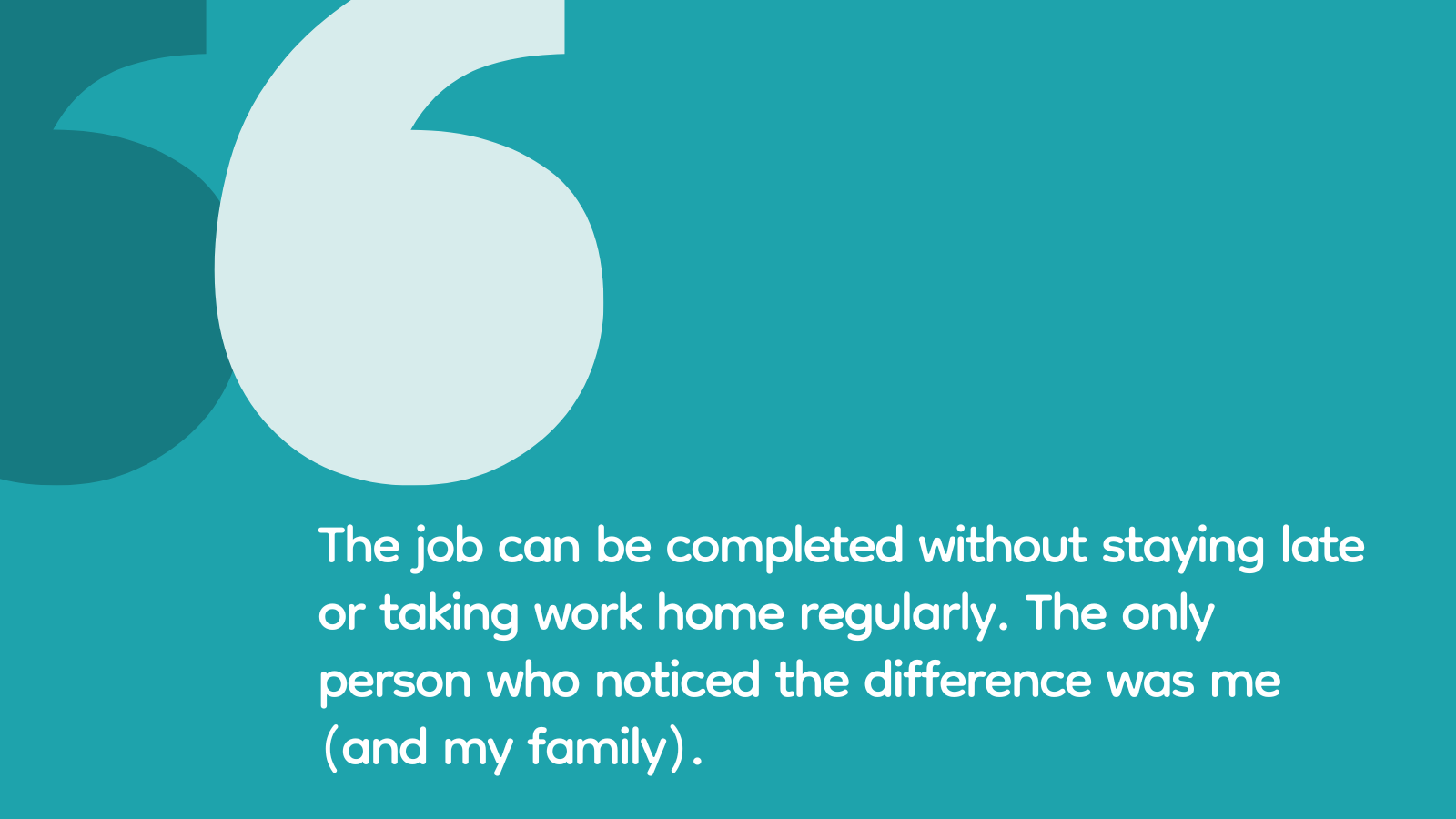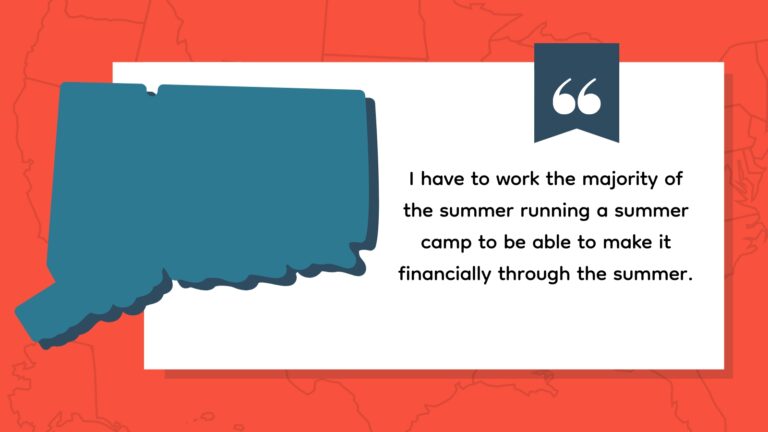As the school year draws to a close, teachers nationwide can finally take a well-deserved breather. With another year under their belt, many teachers find themselves reflecting on the triumphs and challenges of the past year. Reflective practice helps teachers uncover valuable insights about what worked and what didn’t and gain self-awareness about their beliefs and approaches.
With classrooms closing their doors for the academic year, we were curious about the profound lessons teachers have reflected on from their experiences this year. We asked teachers on Facebook, “What is one thing you learned this year that will help you next school year?” From the responses, five major lessons emerged, capturing the spirit of the 2023-2024 school year.
What is one thing you learned this school year that will help you next year?
1. Prioritizing myself!
Hey, now—are we starting to learn to put ourselves first? You can’t pour from an empty cup! Teachers reported that they recognized the importance of prioritizing their personal well-being over their work lives.
“You can be easily replaced … my health and family come first!” —Nancy R.
“Take your sick and personal days! You need to focus on self-care and respite; we are not superhuman.” —Beckie S.
“Working 80 hours a week is bad for me and my family. Going on year 16 and no more ‘do it all’ attitude.” —Michelle M.
This newfound emphasis on prioritizing self is a powerful lesson that will undoubtedly shape teachers’ approach in the coming school year.
2. Setting boundaries
And right along with prioritizing our well-being, setting healthy boundaries is paramount. As I read through the numerous teachers sharing their lessons in boundary setting on this post, I felt so refreshed at how much healthier the conversation among teachers is around work.
If you’re like me and boundaries are a newer concept for you, check out what therapists, this teacher, and these Facebook commenters had to say:
“Give 100% during the school day and then LEAVE IT THERE. Family is precious, and they need and deserve you.” —Lisa J.
“Unless it’s a YES, say no.” —Tammy B.
“The job can be completed without staying late or taking work home regularly. The only person who noticed the difference was me (and my family).” —Jenny P.
“To stop taking work home. That I can do my best, and parents can still misunderstand. To wait overnight to respond to an angry message and to be calm and firm.” —Alina G.
When it comes to establishing boundaries, each teacher’s approach will differ. I set boundaries by never staying at school past 4:30 p.m. under any circumstances, refraining from opening my school email at home, and committing to only one extracurricular school activity. Everyone’s boundaries will look different, and finding what works best for you is essential. As you carry your boundaries into the following year, you’ll discover a newfound sense of empowerment. There is tremendous power in saying no. Remember, “No!” is a complete sentence!
3. Professional and personal growth
This year, teachers learned lessons about themselves inside and outside the classroom. Some learned to stand up for themselves more, to not gossip with other coworkers, not to be as trusting with their administrators, and not to lower their standards for students when parents start to push back.
“Step back and let others step up.” —Eryn W.
“Don’t compromise your values!” —Brendon T.
“To get respect from others, I have to respect myself first.” —Elsie F.
And Sandy A. shares one of my favorite personal growth lessons learned as a teacher: “Pick your battles!”
4. Tips from experienced teachers
In addition to personal growth and reflection, teachers have gathered valuable tips to make their teaching journey more accessible and practical. These insights shared by experienced educators can inspire and guide fellow teachers:
“Take it one day at a time. Plan for your week or month, but don’t get hung up on a schedule.” —Jamie G.
“1. I can’t reach every student, and I can’t take it personally if some don’t like me. 2. The secret to earning respect from students and parents: Be consistent.” —Eugenia L.
“Continue to document EVERYTHING that takes place that’s inappropriate and out-of-order. That goes for colleagues and administrators alike because they will do both, and you must protect yourself in a toxic work environment.” —DeLa N.
“Add more humor. Laugh with your students.” —Anne R.
“Students will learn more from you when they trust you.” —Amanda D.
These practical tips and lessons will help teachers embark on the next school year with renewed confidence. I think we could all learn to laugh a little more!
5. It’s the little things!
Sometimes small changes can make the biggest impact. Check out what these teachers had to say about the little things that packed a big punch:
“I bought a small wooden tray and arranged a pretty charcuterie for lunch. I looked forward to it every day, and I swear, the act of arranging my cheeses, fruits, and nuts was like some little Zen ritual.” —Sarah F.
“Filling my classroom with plants brought me so much joy!! —DJ S.
“I made a big effort to be outside more this school year. I tied more curriculum to outdoor learning, I ate my lunch outside when the weather permitted, I snuck outside when I had a break. These small changes definitely made me feel less stir-crazy at the end of each day!” —Nina C.
6. Retirements and new environments
Some teachers learned this school year that forcing the wrong puzzle piece to fit no longer worked for them. Several teachers commented they were excited about retirement, like Wendy S.: “Retirement is phenomenal!”
Jeff I. teases, “Being a retired teacher is the greatest type of teacher to be.”
Some say that letting go of years of teaching and moving toward rest is good. Other teachers, like Teresa A., described learning “to know where enough is enough and when it is time to walk away.”
Teachers learned there is power in fresh starts and new environments too—there are several comments about walking away from their toxic environments toward fresher, more current opportunities. After several long years in the same position and school, stepping back and finding a new school is OK. Hey, there may even be some perks like a job promotion just waiting on the other side! With each transition, teachers embrace the unknown and are eager to uncover the upcoming possibilities.
As teachers end another school year filled with triumphs and challenges, they begin a well-deserved, reflective break. From prioritizing self-care and setting boundaries to fostering personal and professional growth, educators have embraced their changes and discovered the power of saying no. As we share their practical tips and lessons, we eagerly anticipate the coming year.
Wait, did I really just say that? Am I already talking about next year?

